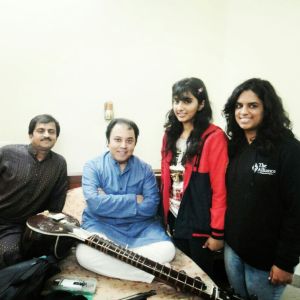<em><strong>Interview by Deepika Naryani and Nishtha Jain</strong></em>
<em><strong>Written by Vandana Miglani</strong></em>
A <em>sitar </em>player based in Canada, Ustad Irshad Khan is the second son of Ustad Imrat Khan. Internationally recognized as one of the world’s leading<em> sitar</em> and <em>surbahar</em> player<span style=”font-size: 13.3333px; line-height: 20px;”>,</span> he is well versed with classical, worldbeat, and also, new age music. The Alliance had the opportunity to interview him in the week-long cultural extravaganza, Virasat ’16 , organised by Spicmacay – NSIT Chapter.
<img class=”wp-image-3483 alignright” src=”http://alliancensit.com/wp-content/uploads/2016/04/IMG-20160405-WA0000-300×300.jpg” alt=”IMG-20160405-WA0000″ width=”251″ height=”251″ />
<strong>Sir, your international debut was at the age of thirteen. How did you develop interest in <em>sitar</em> at such a </strong><strong>young age?</strong>
I was born in a family of musicians. All the members in my family have been legendary figures in the industry of music – my father, my uncle, my grandfather, my great grandfather and even my forefathers.
So basically, it goes back to almost 300 years. I guess music has been in my genes! I developed interest right from the beginning and so, I don’t remember the first day when I did music. I learnt it like you learn your mother tongue.
<strong>Sir, do you have any memories of your first international performance at the age of thirteen?</strong>
Actually, my first performance was when I was six years old. I did my first recital in Calcutta at the age of seven and then when I was thirteen, my dad introduced me to people like Pandit Ravishankar Ji and Ustad Farhad Ali Khan Sahab. It was very exciting and a great privilege for me.
<strong>You are recognized as one of the world’s leading <em>sitar</em> and a s<em>urbahar</em> player. Since most people aren’t familiar with the concept of a bass sitar, please tell us more about it. </strong>
<em>Surbahar</em> is a bass version of a sitar. It is a much bigger version of the <em>sitar</em>. People call it the father of sitar. The strings are much heavier. It is what a cello is to a violin. The technique is more powerful and more difficult because the strings are thicker. The <em>surbahar </em>also has the capacity to bend one octave from a single note. Like <em>sa re ga ma pa dha ni</em> literally from one note. So that is one of the very good things about <em>surbahar</em>. It is also invented by one of my great great grandfathers, whose name was Sahabdar Khan. He was the inventor of this instrument. Also, the kind of <em>raags</em> that we choose to play with this are also deeper than those from a sitar. It has got more depth to it.
<strong>Sir, you are the founder as well as president of the Academy of Musicians. How does this academy promote music?</strong>
Most of my students are musicians as well. They are professional musicians who are there to enhance themselves musically. So that includes guitar players and even drummers, who basically want to develop themselves further. We have decided not to take beginner students who just want to learn sitar or vocals or something. We have branches in Canada, New York and Mumbai.
<strong>What makes <em>sitar</em> special for you, over all the other instruments?</strong>
You see, my father was a sitar player, my grandfather was a <em>sitar</em> player, so I was born into it. That was the first instrument given as a toy to me to play around it, so I just developed interest in <em>sitar</em>. I have a beautiful childhood memory of the <em>sitars</em>. When I was growing up, we used to have nice <em>sitar </em>makers at that time. They would just come to our house and they would make <em>sitar</em> for us and I started practicing it from the beginning, since my childhood and there has been no looking back.
<strong>Sir, do you think Spic Macay is promoting Indian culture among the youth in India and abroad?</strong>
Definitely. Hats off to Spic Macay and to Mr. Kiran Seth as well, who started it. I think Spic Macay is doing one of the finest jobs to promote this music in youth. It is very important. It has been a great privilege for me to work with Spic Macay. Me and Mr. Vinod, who is an established player, have been touring many different parts of India with this program. I wish Spic Macay all the best and I can see this going really forward.

